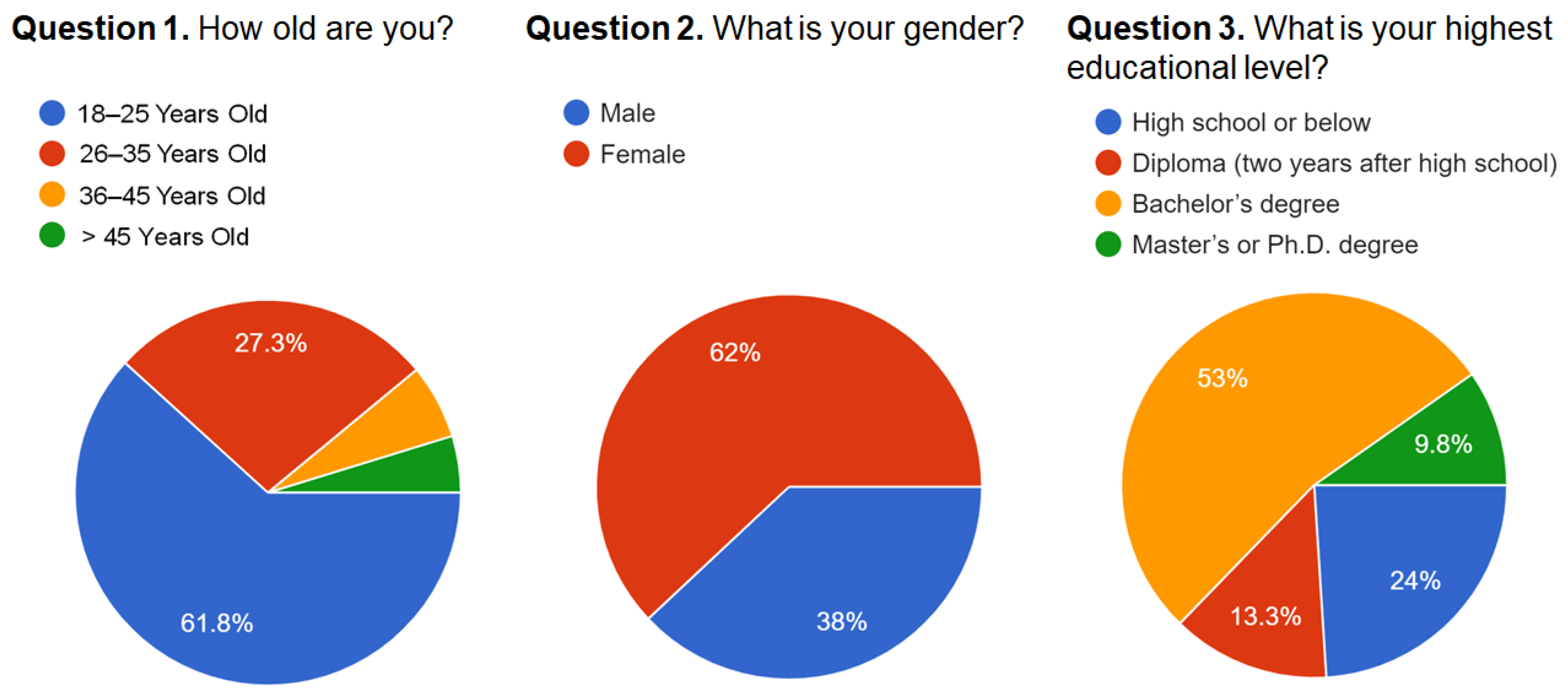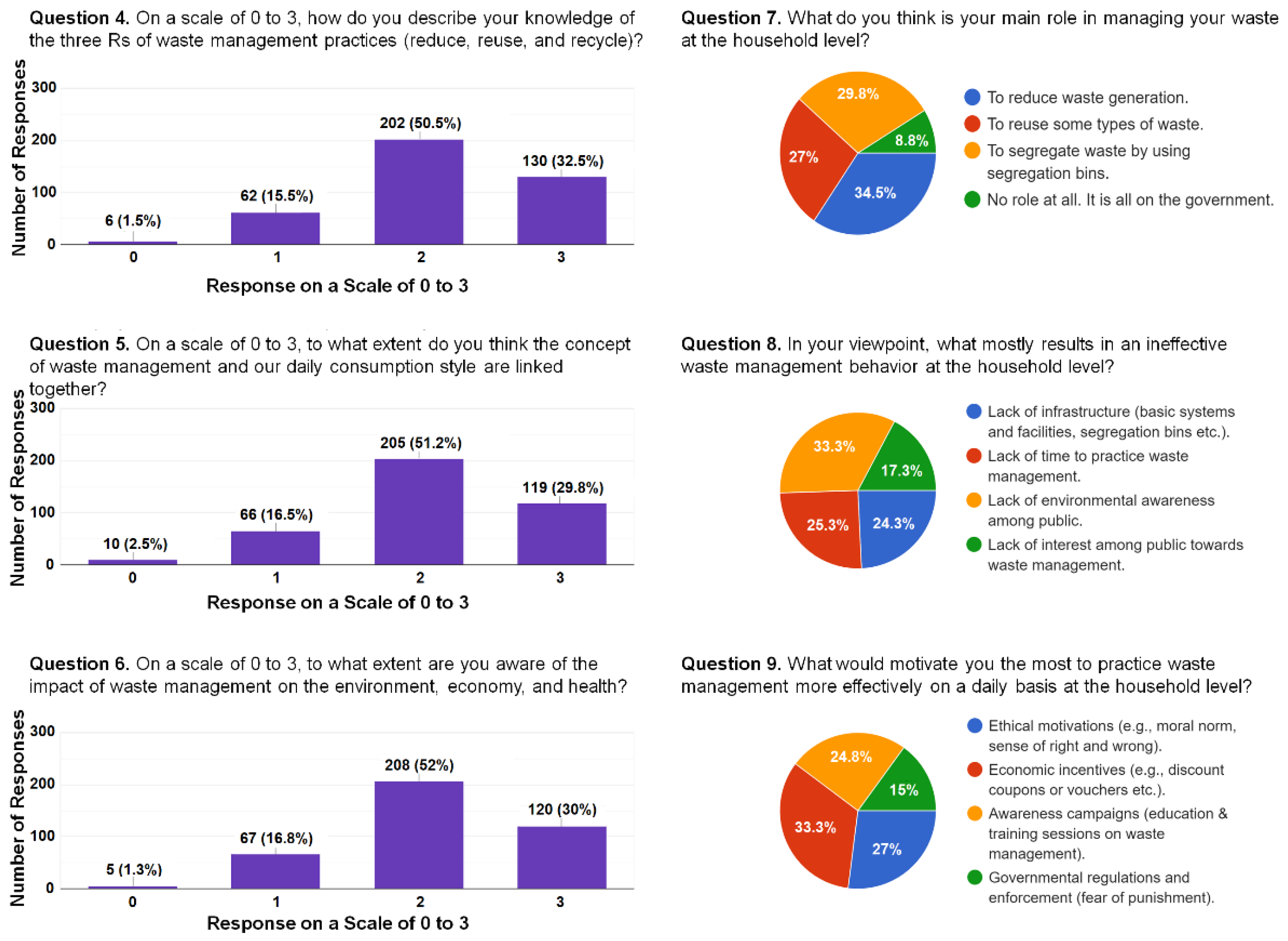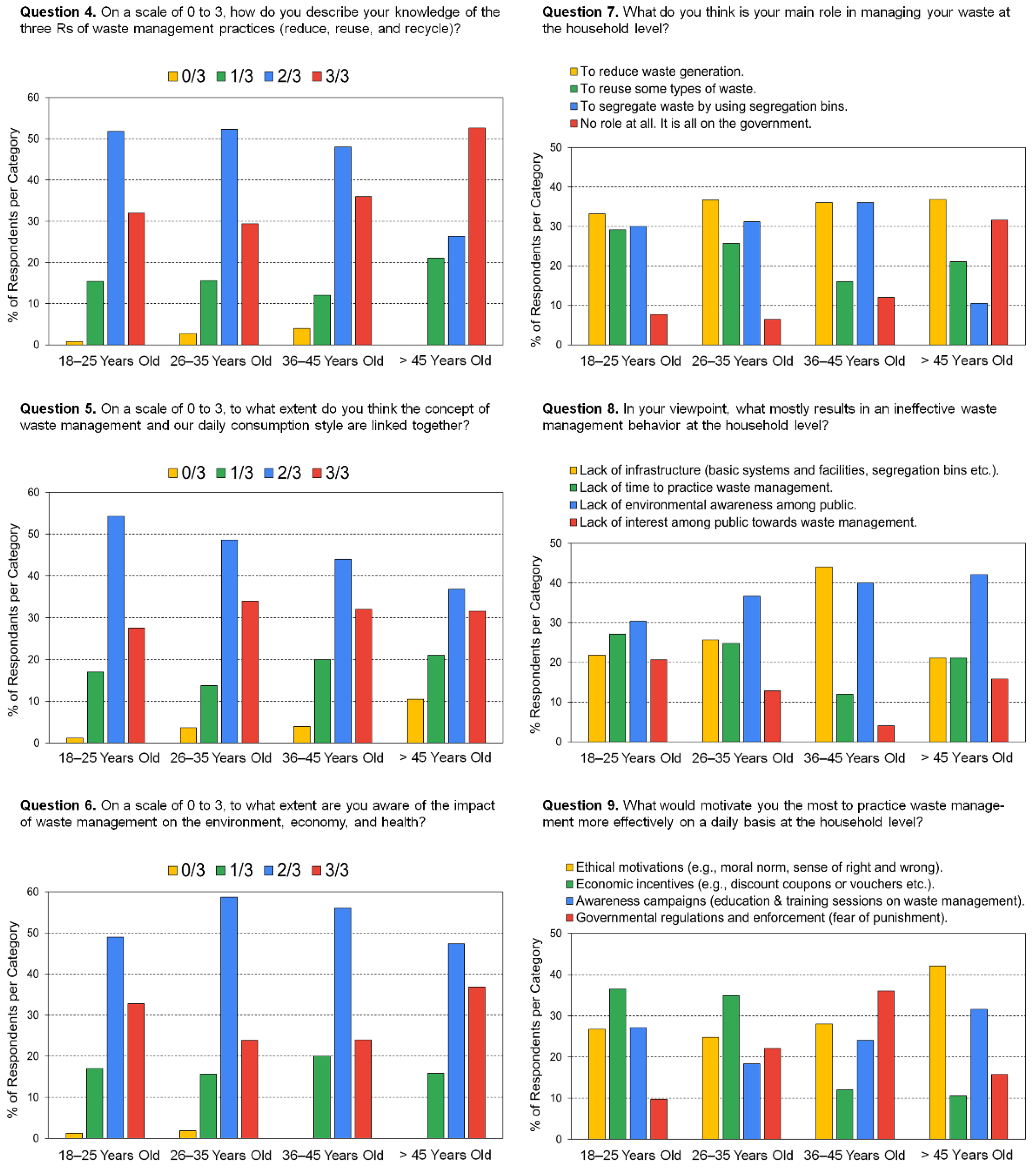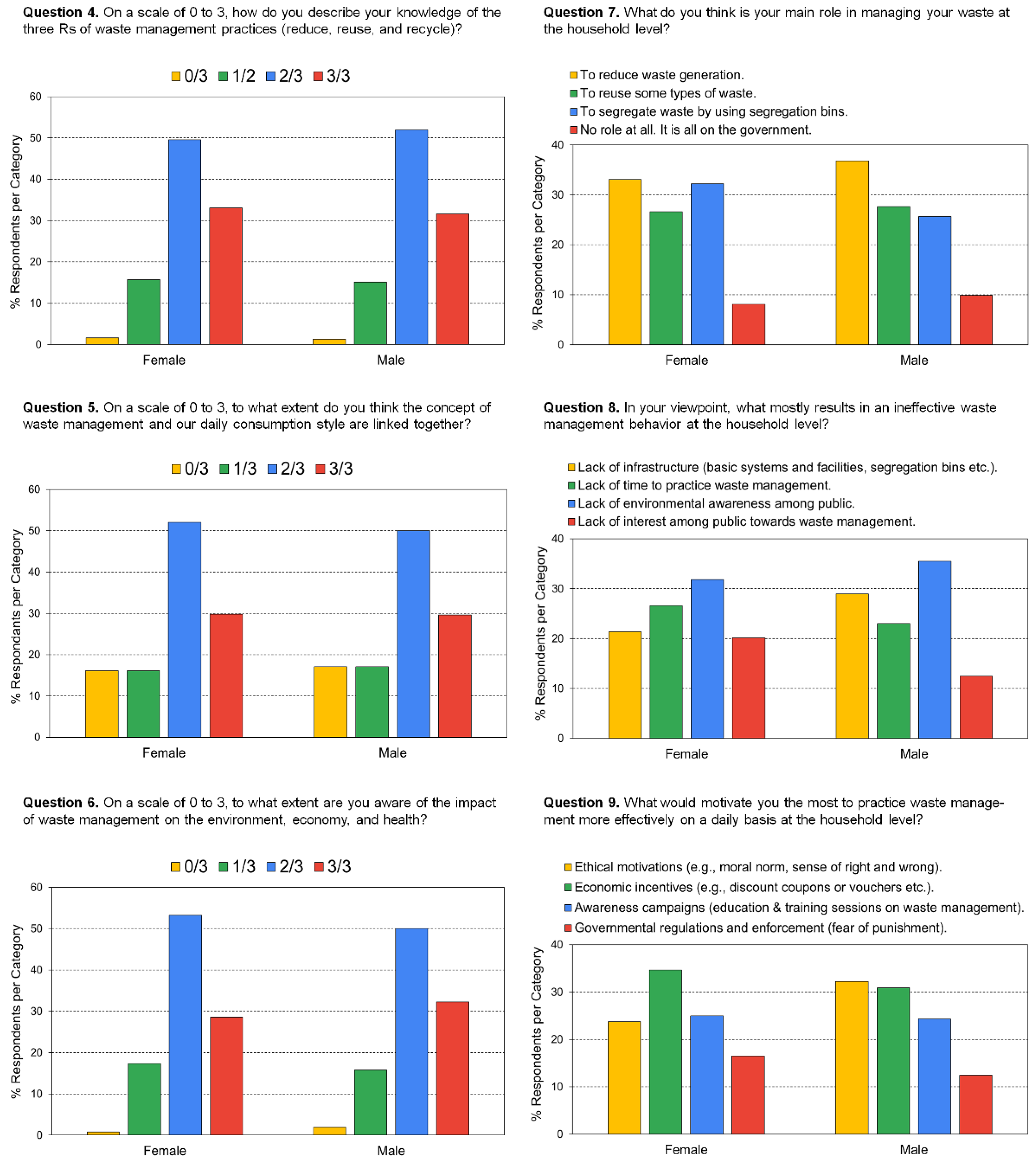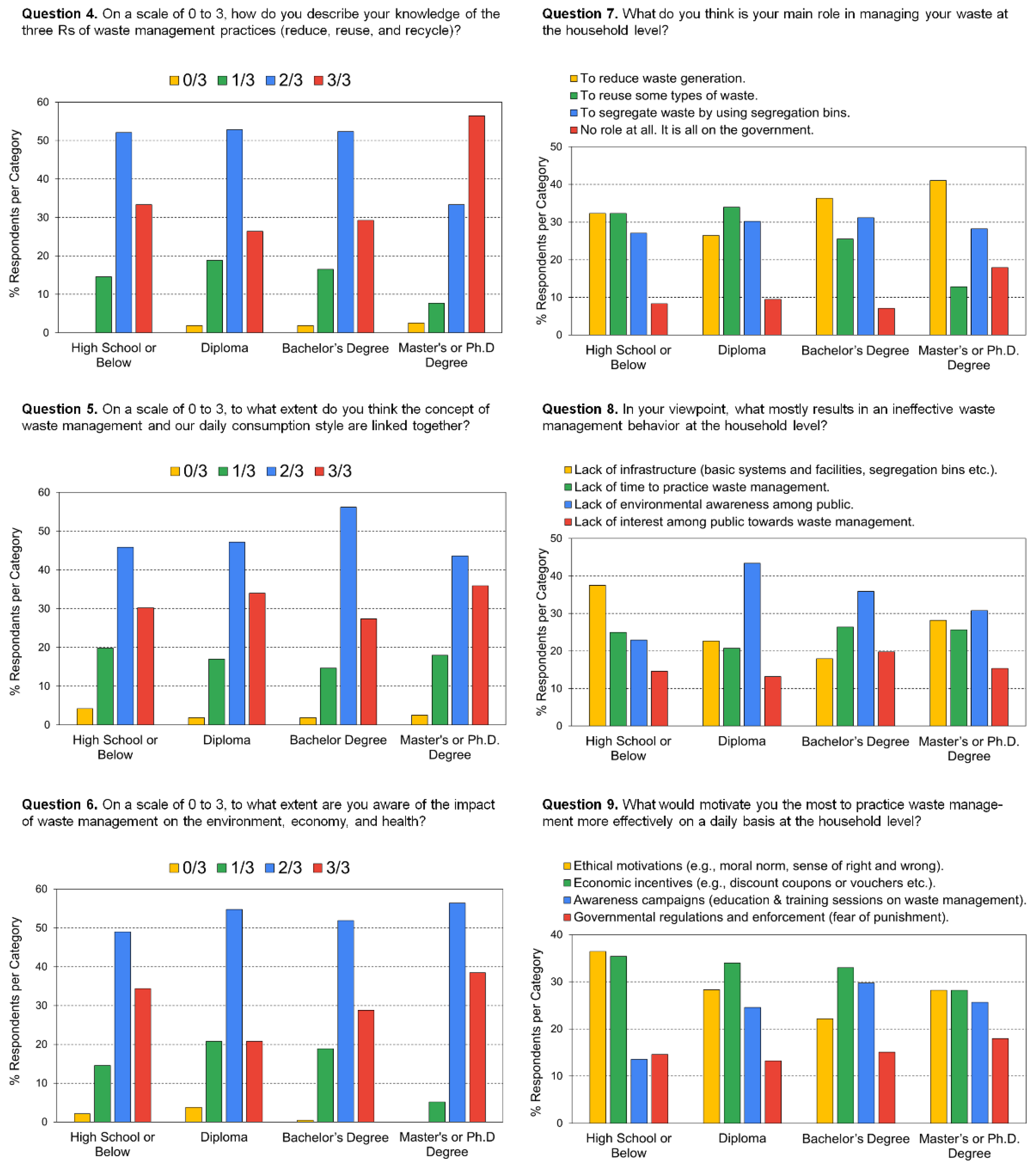1. Introduction
The term “Green Building” refers to infrastructure which is environmentally sustainable through reducing its energy and water consumption, waste generation, and negative impact on the surroundings and human health [
1,
2]. This idea was initially discussed in the United Nations Conference on Environment and Development (UNCED) in Rio de Janeiro’s gathering in 1992, in which the Rio Declaration on the Environment and Development and the Agenda 21 were proposed. This promoted the concept of sustainable development in the field of buildings and led to the realization of green building as one of the main directions for sustainable development [
3]. Green buildings have gradually gained significant importance in the last two decades as these buildings can benefit the environment, economy, and society overall. In contrast with conventional building, a green building offers solutions to many global issues such as the high energy consumption, water-resources depletion, other natural resources’ unsustainable consumption, and the increasing waste generation [
4].
Considering the situation of the United Arab Emirates (UAE), its mega urban development and practices towards fast economic growth need to be analyzed in terms of sustainability because it has become one of the major per capita air polluters and has been listed among the highest per capita fossil fuel consumers [
5,
6]. Moreover, as it has attracted huge amounts of tourists and immigrants from all over the world, its average population and therefore its public demands for energy, water, and other natural resources have significantly increased, along with huge amounts of generated waste. It is worth mentioning that according to a report by the World Wildlife Fund, the Emirate of Dubai has been listed as the second-largest per capita emitter of carbon worldwide [
7]. Therefore, the UAE started to implement the concept of smart cities, along with several other strategies within its emirates, to achieve sustainability and a green economy. For instance, Dubai and Abu Dhabi have established Masdar city, Zayed smart city, and Smart Dubai [
8]. Upon the success of the Dubai Sustainable City project, Sharjah Sustainable City has also been developed in Sharjah, another emirate [
9]. Apart from these, many other sustainable projects and green strategies have been initiated to turn the UAE from a polluter to a protector. The aim of the UAE in implementing such strategies and initiatives is not only to reduce the environmental impact of the built environment on the natural environment, but to also provide its residents an improved quality of life within a built environment that uses less amounts of water, energy, and other natural resources and generates less waste throughout its life cycle [
10,
11]. It is, however, important to highlight that achieving sustainability and providing a good quality of life for all UAE residents cannot be achieved unless the residents themselves also start to adopt a sustainable and healthy lifestyle [
12]. In other words, every resident’s sustainable behavior and active participation in green strategies and initiatives is vital for achieving the overall goals of sustainability. If residents fail to behave sustainably towards energy, water, other resources’ consumption, and waste management within their built environment, then the whole country could most probably fail to achieve these goals [
13,
14]. This work, therefore, aims to assess the greenness of UAE residents by investigating their knowledge, attitude, and practices (KAPs) towards green buildings with a focus on waste management at the household level.
The rapid increase in the UAE’ population and its residents’ current lifestyle have resulted in large amounts of generated waste [
15]. Studies have shown that households in the UAE have one of the highest rates of waste generation in the region. On average, around 2.7 kg of municipal solid waste is generated every day per UAE resident [
16]. Therefore, the UAE aims for recycling 75% of its municipal solid waste, but the lack of public awareness results in ineffective behaviors towards waste management at the household level [
17]. Several studies on household waste separation have indicated that municipal solid waste is among the life-threatening issues, and public participation in a waste-separation scheme is crucial [
18]. This participation could be significantly dependent on several demographic and socio-economic factors [
19,
20]. Furthermore, for any implemented waste-management-related intervention to succeed, the target audience should be provided with the right content and through the right channels considering the socio-demographics of the target audience [
21]. For that reason, this work also aims to investigate the impact of demographic factors such as the ages, genders, and education levels of the UAE residents on their knowledge, attitudes, and practices towards waste management in their households.
Scholars have long proven a connection between socio-demographic characteristics and human behavior, and several studies investigated the correlation between demographic factors and waste-management behaviors. However, these studies showed some contradictions on whether demographic factors can be a significant determinant of household waste-management practices or not. For instance, a study that examined Canadian households showed that socio-demographic characteristics play a significant role in predicting such practices [
22]. Other studies have reported the same behavior in the Czech Republic [
23] and Iran [
24]. A study in Guinea also reported that demographic variables have a significant impact on waste-generation behaviors. Young people tended to generate more waste due to the lack of awareness and responsibility towards the environment as per the study [
25]. Kannangara also showed that waste generation is dependent on the quality of life of residents, in addition to their ages and educational levels [
26]. Aschemann et al., reported that female residents may know and care more about waste-management practices than male residents [
27]. On the contrary, other studies showed that even though there is a correlation, it is small and cannot be taken into consideration [
28]. Moreover, research published in Mexico opposes the above studies, which suggested that demographic variables have a small influence on conservation behavior, and there is no impact of gender, age, or educational background on recycling habits specifically [
29].
Due to these contradicting studies, this study aims to assess the correlation between waste-management behavior and demographic variables of UAE residents, which may help policy makers to design effective policies and strategies for the UAE population to improve the waste management and resources conservation at the country’s level.
3. Results and Discussion
The questionnaire in this study aimed to assess the knowledge, attitudes, and practices of 400 UAE residents towards effective waste management in their households. It consisted of nine questions. The first three questions collected certain demographic information of the residents; namely: age, gender, and educational level. The results showed that around 62% of the responses were received from the 18 to 25 years age group and 27% were aged 26 to 35 years old, while only 6% were aged 36–45 years old and 5% were over 45 years old (
Figure 1). Around 62% of the participants were female and 38% were male. In terms of their level of education, around 53% of the participants had bachelor’s degrees, 13% had diplomas, 10% had Master or Ph.D. degrees, while 24% of the participants had only a high school degree or less.
The second set of questions (six questions) aimed to assess the KAPs of the UAE residents towards waste management at the household level. The first three questions aimed to rate on a scale of zero to three (from not familiar/aware at all to fully familiar/aware) their knowledge about certain aspects of waste management. In detail, Question four investigated the residents’ knowledge about the Three Rs of waste management (reduce, reuse, and recycle) to better understand households’ waste management behaviors (
Figure 2). Half of the participants believed that they were fairly familiar about the three Rs (two on a scale of three), while around one third believed they were fully familiar (three on a scale of three). The rest (around 15%) were either not familiar at all or barely familiar (zero or one on a scale of three). Question five explored whether the residents thought that their daily consumption style and waste management were linked together. Similar to Question four, around half of the participants believed that their consumption style was fairly linked to waste management, while around 30% thought that they were strongly linked. The rest (around 20%) thought that they were barely linked or not linked at all. Similarly, regarding their awareness about the impact of waste management on the environment, economy, and health (Question six), around 80% of the participants were fully or fairly aware of that (52% fairly aware and 30% fully aware). A total of 17% were not much aware, and very few participants (1%) were not aware at all. This highlights the need for further awareness campaigns at the country level on waste management and the impact of our consumption style on waste generation and consequently on the environment, public health, and the economy.
Question seven asked the residents about their main role in waste management at the household level. Around one third of the participants (35%) shared that they thought that their main role was to reduce waste generation, while 30% considered segregating waste by using segregation bins as their main role. Around 27% believed that reusing some types of waste was their main role, while few participants (9%) believed that they had no role at all and that waste management was all the responsibility of the government. This is a small percentage, considering that a study in Sri Lanka showed that most people there assumed that waste management was exclusively the responsibility of the government and not theirs [
31]. In order to identify the most common reasons behind ineffective waste-management behaviors by the UAE residents (Question eight), one third of the participants considered the lack of environmental awareness among public as the most common reason, but in the viewpoint of around 25% of the participants, it was the lack of time followed by the lack of infrastructure (ca. 24%), whereas lack of interest among the public towards waste management was chosen the least (ca. 17%) among all reasons. A previous study by Al-Dabbagh in 2021 showed that the lack of public awareness can result in ineffective behaviors towards waste management at the household level [
17], but Sri Lankans believed in a previous study that the lack of governmental funding and facilities, not public awareness, was the most significant reason that prohibited them from effectively managing their waste [
32], while a study in India blamed both public ignorance and a lack of resources, infrastructure, and regulations as the main causes [
33]. The same results were also reported in a similar study in Guinea [
34]. The last question (Question nine) explored which interventions could improve the residents’ daily waste-management practices. One third of the participants chose economic incentives as the most effective motivator, while ethical motivations and awareness campaigns were the second choices. Surprisingly, only around 15% of the participants believed that governmental regulations and enforcement could trigger UAE residents to manage their waste on a daily basis. This highlights that UAE residents may prefer self-motivation, which gives them more freedom, rather than forcing them to act in a certain way [
35]. Overall, these results are in a partial disagreement with previous studies, in which the majority of participants connected internal stimuli directly with their behavioral decisions, whereas others found external stimuli such as economic incentives, punishments, policy regulations, facilitating conditions, or society as more effective towards waste-management behavioral decisions [
18,
36]. They were also in a partial disagreement with a previous study that showed that awareness campaigns were chosen as the most effective intervention followed by economic incentives, highlighting that the only possible way for people to engage in environmental interventions is to realize the damage they cause by their actions and choices and the positive change that might occur if they comply [
37]. However, the results tie well with a previous study wherein people were already concerned about waste-related issues, so they did not actually need any additional awareness campaigns but rather interventions that facilitate achieving waste-management goals [
38], and with another study that reported that economic incentives might be the most effective in promoting the waste-management compliance of households [
35]. To sum up, it is recommended to prepare a blended series of interventions and policies to be provided to the public to achieve the desired impact [
39]. Community awareness and participation can never be enough; it is the duty of all parties to work together; governmental, non-governmental, and the public. As a matter of national policy, authorities need to enforce waste-minimization regulations [
37]. In light of this, it is proposed that policymakers and local authorities need to set evaluation and monitoring programs to ensure the effectiveness of any plan before it being implemented [
40].
This work also aims to investigate the impact of UAE residents’ demographics on their knowledge, attitudes, and practices towards waste management, with a focus on age, gender, and educational level. Such impacts may help policy makers to develop suitable waste-management interventions to the UAE’ society based on their demographics. Starting with the impact of age, the results showed that around half of participants from all age categories, except for those who were 45 years old or older, considered themselves fairly knowledgeable about the three Rs of waste management (two on a scale of three), while more than half of the 45 years-old-and-older age category believed that they were fully knowledgeable (three out of three) (
Figure 3—Question four). Furthermore, less than 25% of the four age categories considered themselves not-much knowledgeable or not knowledgeable at all (zero or one out of three). An ANOVA test was conducted and showed that there was no significant difference (
p-value of 0.6 > 0.05), which implied that age overall does not significantly impact UAE residents’ average knowledge of the three Rs of waste management. This contradicts previous studies that showed that older people have better knowledge of and apply more the three Rs in their households compared with younger ones due to the lack of awareness and responsibility towards the environment [
25,
26,
41]. Regarding the impact of their consumption style on waste management, the percentage of those who thought that they are fairly interlinked (two on a scale of three) was the highest for all age categories (more than 35%), which interestingly decreased with participants’ age (
Figure 3—Question five). On the other hand, the percentage of those who thought that there is no link at all between consumption style and waste management (zero on a scale of three) was the lowest for all age categories (less than 11%), which increased with the participants’ age. An ANOVA test, however, showed that no significant impact was detected (
p-value of 0.1 > 0.05). In terms of their knowledge about the impact of waste management on the environment, economy, and health, more than 45% of the participants from all age categories showed that they were fairly aware of it (two on a scale of three) (
Figure 3—Question six), while less than 2% of the participants from all age categories considered themselves not aware at all about this impact (zero on a scale of three). An ANOVA test showed that there is no significant difference (
p-value 0.62 > 0.05).
Regarding what they thought their main role in waste management was, more than one third of the participants from all age categories indicated that it was reducing waste generation (
Figure 3—Question 7). Waste segregation was the second choice for all age categories except those older than 45 years old, who mostly believed that they had no role at all. The reuse of waste was the third choice for all age categories. In conclusion, 45 years old and younger participants were more aware about their role in waste management and that it should not be left all on the government. This is contrary to a study by Assaf eta al., which reported that age is not highly associated with resident’s recycling behaviors and attitudes [
20]. In terms of the main reason for ineffective waste management at the household level in the UAE, the results showed that in the point of view of all age categories, lack of environmental awareness was the main reason behind that, except for the 36–45 years old category who considered the lack of infrastructure as the major reason (
Figure 3—Question 8). The percentage of participants who chose lack of environmental awareness increased with age. Lack of interest among public was the least chosen by all age categories. Finally, in terms of what the participants believed would motivate them to effectively manage their waste, a significant variation in responses was observed (
Figure 3—Question 9). Those who were 35 years old and younger would be most motivated by economic incentives. Surprisingly, economic incentives were the least chosen by those older than 35 years old. Ethical motivation was voted as second for all age categories, but first for those older than 45 years old. Moreover, only the 36–45 years old category believed that governmental regulations and enforcement would trigger UAE residents to manage their waste. Awareness campaigns were voted second or third for all age categories. In conclusion, it can be noted that the young generation (35 years old and younger) prefer economic incentives the most, while with increase in age, the value of economic incentives became lower compared with the other three motivations, which were strongly preferred by adults above 35 years old. To summarize, age does not seem to significantly impact UAE residents’ knowledge about waste management, but does more significantly impact their attitudes and behaviors towards it and towards the interventions that may promote it, which was purported by a previous study be Van et al., that showed that people are already concerned about waste-related issues and what they need is interventions that facilitate effective waste management [
38].
Other than age as a demographic factor, gender was also investigated in this study (
Figure 4). The results showed that around half of both genders considered themselves fairly knowledgeable (two out of three) about the three Rs of waste management, while around one third of both genders believed they were fully knowledgeable (three out of three)
(Figure 4—Question four). Only less than 3% of both genders did not know the three Rs. It is clear from
Figure 4 that there was an insignificant variation in the responses of both genders, which was confirmed statistically using a
t-test (
p value of 0.97 > 0.05). Regarding the impact of their consumption style on waste management, the percentage of those who thought that they were fairly interlinked (two on a scale of three) was the highest for both gender (around 50%), while around 30% of both genders could see a very strong link (three on a scale of three) (
Figure 4—Question five). The rest (around 30% of the participants) could see either a small link or no link at all between waste management and consumption style. A
t-test was conducted and showed that gender did not influence the participants’ responses to this question. A quite-similar pattern of responses can be observed for both genders when they were asked to rate their awareness level about the impact of waste management on the environment, economy, and health (
Figure 4—Question six). Around 50% of both genders were fairly aware of this impact, while around 30% were fully aware and around 20% were barely aware or not aware at all. A
t-test was conducted and showed no significant impact of gender on the participants’ awareness about the impact of waste management on the environment, economy, and health. Regarding their main role in waste management, reducing waste generation was the most chosen response by both genders (around third of the participants) (
Figure 4—Question seven). Waste segregation was the second-most chosen role by male participants, while waste reuse was chosen second by female participants. Fortunately, less than 10% of both genders believed they had no role at all in waste management. In agreement with a study by Assaf et al., gender does not seem to highly impact residents’ waste management behaviors and attitudes [
20], but studies by Aschemann et al., and Handayani showed that females may know and care more about waste-management practices than males [
27,
41].
Figure 4—Question eight shows that from the point view of around one third of both genders, the most common reason for an ineffective waste-management behavior was the lack of environmental awareness among people, while a lack of public interest towards waste management was the least-important reason. The second-most-common reason for female participants was lack of time, while it was lack of infrastructure for male participants. In terms of the main motivation to manage waste at the household level, around one third of the female participants could be positively triggered by economic incentives, while around two thirds of the male participants chose ethical motivations in addition to economic incentives (
Figure 4—Question nine). Hence, for female participants, external motivations such as economic incentives are more stimulating, while for male participants, internal stimuli, i.e., ethical motivation, could be most effective. However, both genders have to a great extent similar views on awareness campaigns and governmental regulations.
The third investigated demographic factor was educational level (
Figure 5). The results showed that more than half of the participants from all educational levels except those with a master’s or Ph.D. degree considered themselves fairly knowledgeable about the three Rs of waste management (two on a scale of three). On the other hand, more than half of those with a master’s or Ph.D. degree believed that they were fully knowledgeable (three out of three) (
Figure 5—Question four), while less than 35% of the other educational level categories considered themselves fully knowledgeable. Less than 3% of the participants from all educational levels were not-much knowledgeable or not knowledgeable at all (zero or one out of three). An ANOVA test was conducted and showed that there was a significant difference (
p-value of 0.03 > 0.05), which implied that educational level does significantly impact UAE’ residents’ average knowledge of the three Rs of waste management in agreement with a previous reports conducted in Japan and Canada [
26,
42]. Regarding the impact of their consumption style on waste management, the percentage of those who thought that they were fairly interlinked (two on a scale of three) was the highest for all educational levels (more than 40% of the participants) (
Figure 5—Question five). More than 25% of all educational levels considered themselves fully knowledgeable. On the other hand, the percentage of those who thought that there was no link at all between consumption style and waste management (zero on a scale of three) was the lowest for all educational levels (less than 5%). An ANOVA test showed that no significant impact could be detected (
p-value of 0.1 > 0.05). In terms of their knowledge about the impact of waste management on the environment, economy, and health, more than 45% of the participants from all educational levels showed that they were fairly aware of it (two on a scale of three), while only more than 20% were fully aware (
Figure 5—Question six). Less than 2% of the participants from all educational levels considered themselves not aware at all about this impact. If we excluded those with a high school degree or below, there is an increase in the percentage of fully aware participants (red bars) and a decrease in the percentage of barely and not-at-all-aware participants (green and yellow bars) with the increase in educational level, which was confirmed by an ANOVA test (
p-value of 0.04 < 0.05).
Regarding what they thought their main role in waste management was, most of the participants (around 90%) from all educational levels except those with a master’s or Ph.D. degree were almost evenly distributed over reduce, reuse, or segregate waste, while less than 10% believed they had no role at all (
Figure 5—Question 7). On the other hand, more than 40% of those with a master’s or Ph.D. degree believed that their main role was reducing waste generation followed by segregation, while more than 15% of this educational level category believed they had no role at all. These results showed that the majority of the participants in this study knew their role in waste management and that very few participants did not know their role at all. In terms of the main reason for ineffective waste management at the household level in the UAE, the results showed that in the point of view of all educational levels, lack of environmental awareness was the main reason behind this, except for those with a high school degree or below who considered a lack of infrastructure as the major reason (
Figure 5—Question 8). Interestingly, the percentage of those who chose lack of environmental awareness decreased with the increase in educational level. Those with a master’s or Ph.D. degree also believed that a lack of time and infrastructure were the major reasons. On contrary, lack of interest among the public was the least-chosen reason for almost all educational levels. Finally, in terms of what the participants believed would motivate them to effectively manage their waste, a significant variation in responses could be observed (
Figure 5—Question nine). Economic incentives and ethical motivations were chosen as the most impactful on UAE’ residents’ waste-management behaviors except for those with a Bachelor’s degree, who preferred awareness campaigns over ethical motivations. Except for the participants with a master’s or Ph.D. degree, the percentage of participants in the other educational levels who picked ethical motivations decreased with educational level, but the percentage of those who picked awareness campaigns increased with educational level. The percentage of participants who picked governmental regulation and enforcement was the lowest for almost all educational levels, and did not change significantly with educational level (13–18%).
There are several recommendations that can be put forward based on the results of this study. UAE residents are well aware of the principles of waste management, their role in managing their waste, and the impact of their consumption style on the environment. However, they still believe that more awareness is needed along with the appropriate infrastructure for efficient waste management. Although they asked for more awareness campaigns, UAE residents believe that economic incentives would be more effective. They also believe that being forced by governmental regulations to manage their waste would not improve the waste-management situation in the country. These preferences were influenced to varying degrees by the residents’ ages, genders, and educational levels, although they did not significantly impact the residents’ knowledge about waste management. Therefore, a mix of different interventions should be implemented to trigger UAE residents, whatever their demographics, to effectively manage their waste. Finally, it is recommended that future studies on this topic should be conducted on a bigger sample to better represent the whole population of the UAE. Data-collection methods such as interviews can be more accurate in assessing the level of knowledge or awareness that an individual possesses due to the fact that they give a better chance to receive more detailed responses. However, it was not possible to conduct face-to-face interviews in this study due to the pandemic. This study still gives an overview of the greenness of UAE residents and the impacts of their demographic factors on their households’ waste management behavior, helping decision makers in the UAE to tackle waste-management issues and to select the most effective interventions.
